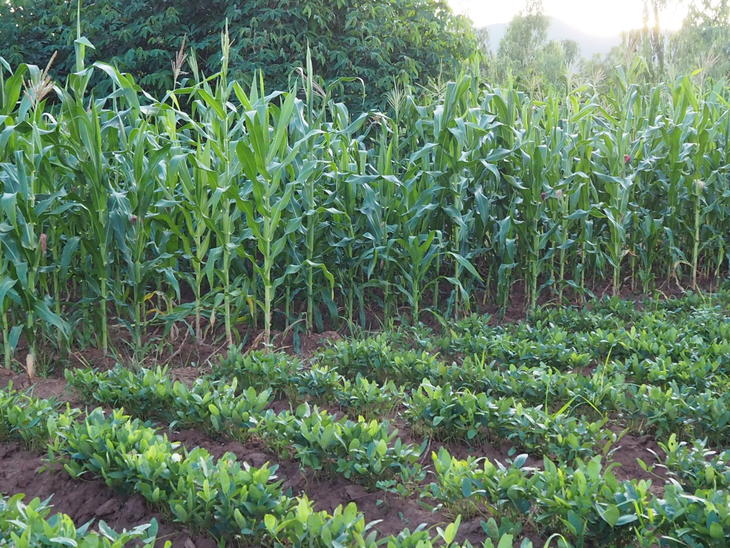
Creating awareness across sectors
Creating awareness across sectors can be done by inviting representatives from the central organizations and institutions in each of the sectors pertaining to Farmers' Rights to cross sector workshops and/or seminars. This can be done at the national and/or regional level, depending on the size of the country and available resources.
This is a list of institutions from all sectors, which might be relevant:
- Farmers: Farmers' organizations, associations, groups and/or networks
- Authorities:
- Parliament, particularly parliamentary committees vested with agriculture and intellectual property rights
- Central relevant departments/units of the ministry of agriculture in the country
- Focal point for the International Treaty on Plant Genetic Resources for Food and Agriculture
- Institutions involved in intellectual property rights (plant breeders' rights and patents)
- Institutions involved in seed certification
- Other relevant agencies, ministries and government bodies, as appropriate
- Research, capacity building and extension services:
- Institutions involved in extension services to farmers
- Gene banks
- Relevant research institutions
- Relevant capacity building institutions, training centres, etc.
- Civil society:
- Relevant NGOs (including also consumer groups)
- Peoples' organizations
- Business: Seed industry and its associations
Seminars and/or workshops can be designed mainly with lectures, information sharing, in more interactive ways, or as a combination of these methods. Probably the effect is higher, the more the participants are involved in the seminars/workshops. Also, the effect is probably higher, if there are more than one seminar or workshop for each of the sectors, so that reflections on the topic can mature and the understanding be deepened.
As the topic of Farmers' Rights can create heated debates across sectors and thus to conflicts rather than progress in the implementation of these rights, it is vital that workshops and seminars are geared towards dialogues. After decades of conflicts and mounting barriers against the realization of Farmers' Rights, it is now vital to move beyond the earlier controversies, build bridges and join forces across sectors to make Farmers' Rights a reality. It is thus crucial that a framework of dialogue is created where the participants are encouraged to listen to each other. Rather than arguing against each other, the participants should be encouraged to present their own needs and priorities, as appropriate, and provide the other participants with the necessary information to understand these priorities. The participants should be encouraged to pose clarification questions, in order to deepen their understanding. If consensus on certain issues arises out of such a dialogue, it is fine, but it should not be forced at this stage of awareness raising.
It can be wise to start out by inviting the farmers present at the seminar/workshop to introduce about the situation of farmers with regard to crop genetic resources and Farmers' Rights - and particularly how this affects their food security and livelihoods. An organized field visit to a farming village, including a dialogue with farmers there on their situation in this regard, may also be a useful measure. Creating awareness on the situation of farmers with regard to crop genetic resources is recommended as a measure setting the stage for any seminar or workshop.
You can read more about the contents relevant for such workshops and/or seminars here and about inspiring success stories illustrating Farmers' Rights here. Where to put the emphasis depends on the level of knowledge and awareness among the participants. Central questions to rise in a workshop or seminar based on, and guided by, these contents can be:
- What contents of Farmers' Rights are important in our country?
- Why are Farmers' Rights important in our country?
- What can the different institutions and sectors do to protect and promote Farmers' Rights?
- How can they join forces and pool resources towards this end?
Advantages:
- This approach is useful to create awareness across the institutions and sectors and thus to enable understanding between actors who often do not have joint arenas for such dialogues.
- If applied according to description above, it might help bridging controversies in the country regarding Farmers' Rights and open up for new alliances for the realization of these rights.
- It enables a division of labour as well as joining forces and pooling resources towards the realization of Farmers' Rights.
Disadvantages:
- The number of participants from each institution will be lower than by an institution or sector wise approach. To counterbalance this situation to some extent, the participants can be encouraged to disseminate the contents of the seminar/workshop in their respective institutions.
- If there is no awareness rising among farmers' organizations and groups beforehand, their representatives might be in a weak position to frame their needs and priorities, as compared to other participants in the seminar/workshop. Thus, it is wise to ensure that activities for creating awareness among the farmer organizations and groups are carried out before cross sector seminar/workshops.